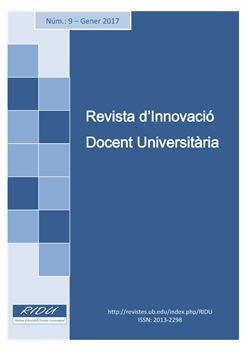Flipped classroom: nursing degree experience
DOI:
https://doi.org/10.1344/RIDU2017.9.10Keywords:
Collaborative learning, Flipped classroom, Formative assessment, Nursing Degree, Active learning methodologies, Psychosocial Sciences Applied to HealthAbstract
At flipped classroom, students work autonomously with tasks previously prepared for this purpose by the professorship. Objective: To evaluate the flipped classroom as innovation teaching and contrast group results with traditional teaching. Context: first course of Nursing Degree at Psychosocial Sciences Applied to Health, core subject (Group C, n = 81). Methodology: qualitative and quantitative, including ad hoc standardized instruments and emphasizing the evaluation performed by peers and verbal verification on the content. The whole process was supervised by lecturers. Evaluation: We conducted the evaluation of the control group and the experimental group, and they compare the results of the rating results. Results: Score out of 10 with means and standard deviation: Intraclass, higher flipped classroom (7,96 + 0,67) vs (5,89 + 1,26) in test (p-value <0,001). Interclass, experimental group (5,89 + 1,26) and control group (6,02 + 1,16) (p-value 0,508). Statistically significant differences were not found. Conclusion: Without test preparation and great additional effort, highlighted the satisfaction for lecturers and students, flipped classroom was clearly favorable for the acquisition of knowledge in the subject tested.
References
Gibbs, G. y Simpson, C. (2009) Condicions per una avaluació continuada que afavoreixi l’aprenentatge. ICE i Editorial Octaedro. Universitat de Barcelona.
Harrington, S.A., Vanden Bosch, M., Schoofs, N., Beel.Bates, C., Anderson, K. (2015) Quantitative Outcomes for Nursing Students in a Flipped Classroom. Nursing Education Perspectives, 36(3), pp. 179-181.
Jensen, J.L., Kummer, T.A., Godoy, P.D.d.M. (2015) Improvements from a Flipped Classroom May Simply Be the Fruits os Active Learning. CBE-Life Sciences Education, 14, pp. 1-12.
Jordan Lluch, C., Pérez Peñalver, M.J., Sanabria Codesal, E. (2015) Educación inversa, una metodología innovadora ¿Coincide la percepción que tienen los alumnos de ella con la nuestra? XIII Jornadas de Redes de Investigación en Docencia Universitaria Nuevas estrategias organizativas y metodológicas en la formación universitaria para responder a la necesidad de adaptación y cambio. Universidad de Alicante. Recurso electrónico recuperado 30/10/2016 (https://rua.ua.es/dspace/bitstream/10045/49558/2/XIII_Jornadas_Redes_148_poster.pdf).
Jordan Lluch, C., Pérez Peñalver, M.J., Sanabria Codesal, E. (2014) Experiencias docentes. Investigación del impacto en un aula de matemáticas al utilizar flip education. Revista Pensamiento matemático, IV(2), pp. 09-022.
Jiménez Muñoz, AJ. (2013). Auge y caída de la clase al revés: ¿Lecciones aprendidas? Recurso electrónico recuperado 30/10/2016 (https://www.academia.edu/7420281/Auge_y_ca%C3%ADda_de_la_clase_al_rev%C3%A9s_lecciones_aprendidas?auto=download).
Missildine, K., Fountain, R., Summers, L., Gosselin, K. (2013) Flipping the Classroom to Improve Student Performance and Satisfaction. Journal of Nursing Education, 52(19), pp. 597-599.
Rodríguez Learte, A.I., Fernández Vaquero, A., Vega Avelaira, D. (2015) Desarrollo de metodologías de “flipped classroom” para asignaturas de ciencias básicas: valoración de los alumnos. XII Jornadas Internacionales de Innovación Universitaria. Educar para transformar: Aprendizaje experiencial, pp. 692-698.
Schwartz, T.A. (2014) Flipping the Statistics Classroom in Nursing Education. Journal of Nursing Education, 53(4), pp. 199-206.
Simpson, V., Richards, E. (2015) Flipping the classroom to teach population health: Increasing the relevance. Nurse Education in Practice, 15, pp. 162-167
Strayer, J.F. (2007) The effects of the classroom flip on the learning environment: a comparison of learning activity in a traditional classroom and a Flip Classroom that used an intelligent tutoring system. Dissertation Presented: Degree Doctor of Philosophy in the Graduate School of The Ohio State University (Dr. Douglas T. Owens, Adviser). Recurso electrónico recuperado 30/10/2016 (https://etd.ohiolink.edu/rws_etd/document/get/osu1189523914/inline).
Wong, T.H., Ip, E.J., Lopes, I., Rajagopalan, V. (2014) Pharmacy Students’ Performance and Perceptions in a Flipped Teaching. Pilot on Cardiac Arrhythmias. American Journal of Pharmaceutical Education, 78(10), pp. 1-6.
Downloads
Published
Issue
Section
License

This work is licensed under a Creative Commons Attribution 4.0 International License.
Authors whishing to publish in this journal agree to the following conditions:
- The author or author retain copyright and grants the journal the right of first publication of the paper.
- The texts will be published under license "Reconocimiento Creative Commons 4.0 España", which allows to share, distribute, reproduce and the public communication of the paper, as long as the name of the author or authors and the journal are clearly stated.







